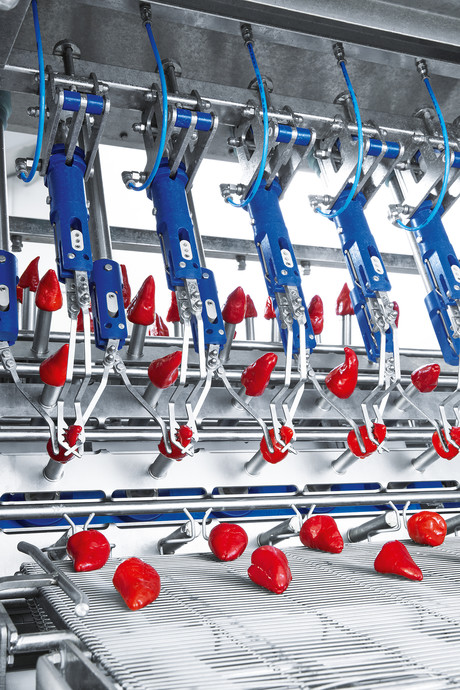Well filled

Peppers, chillies and olives with a filling are classic Mediterranean starters. The tasty dishes should be fresh, full of flavour and also a treat for the eyes. The antipasti specialities can now be found in food shops in an increasing number and variety. Until now, filling the little delicacies has purely been a manual job — a time-consuming and cost-intensive one. Automation technology now makes the process easier and faster.
Even though many steps in industrial food production are already automated, filling antipasti is still a manual job. Practised employees do manage to fill up to 1000 items an hour, but it is an exhausting procedure which requires a high degree of hygienic care due to the manual processes involved. Each individual fruit has to be picked up by hand and then filled with cream cheese. During the process, food manufacturers have to work quickly and above all in a hygienically sound manner whatever happens.
Automatic filling and cleaning
Mechanical engineering company Karb Maschinenbau has, with help from Festo, developed a machine that automatically fills peppers, tomatoes and chillies. The employees only need to place the fruit or vegetables onto filling nozzles. The machine does the rest using automation components supplied by Festo. In this way, up to 14,500 antipasti an hour can be produced.
Sophisticated, highly sensitive sensor technology — details of which Karb Maschinenbau is keeping under wraps for product protection reasons — ensures that the correct amount of filling is dispensed. The sensors automatically detect when the pepper is full and report it to the machine controller within a fraction of a second. The machine controller then sends the stop signal to the Festo cylinder EPCO, which is responsible for the filling process. Because hygiene is as important as speed in the food industry, the system has an automatic cleaning program. A solution of water and cleaning agent instead of cream cheese is flushed through the pipes to clean them.


20 peppers in one swoop
Two EvoGuard valves, 20 EPCO cylinders, five valve terminals CPX/MPA, 20 cartridge cylinders EGZ and an MS series service unit keep the process running smoothly. The hygienic valves EvoGuard, which are tailored precisely to the requirements of the food industry, control the infeed of the cheese at process level, while the EPCO electric cylinders take care of the actual filling process. They draw cream cheese into a type of syringe and inject it into the vegetable. The combination of system controller and sensors ensures the perfect fill quantity. 20 vegetables can be filled at a time in this way.
Because the cavities of peppers, chillies, etc, vary in size, the system uses its sophisticated sensor technology to detect the level of each individual vegetable and waits until the last is filled to the top with cream cheese before placing all the vegetables onto a conveyor at the same time. The valve terminal CPX/MPA, which controls the proportional valves for the grippers, ensures highly sensitive gripping without pressure marks. The grippers developed by Karb Maschinenbau use Festo cartridge cylinders EGZ.
The production speed has been increased by more than 3.5 times with this technology. In the meantime, the mechanical engineering experts from Karb are already working with Festo on the next development stage, which is expected to automate the feed and packaging process.
Novel food processing technologies retain more nutrients in food
The potential of a range of modern techniques to improve the nutritional profiles of grain-,...
Shaking up machine changeover times on cartoning line
A food manufacturer of shakes and protein bars reduced the time taken for machine changeovers on...
Five trends set to shape Australia's food & beverage industry in 2026
Australia's food and beverage manufacturing sector is standing at a crossroads of opportunity...








